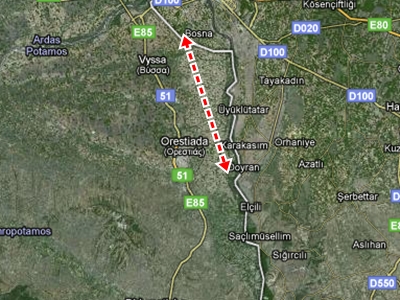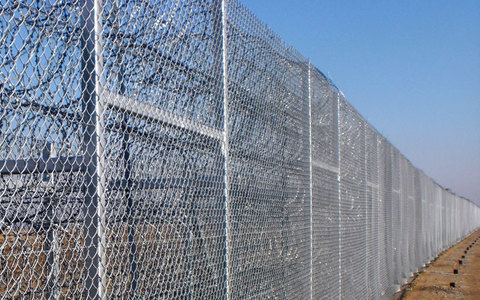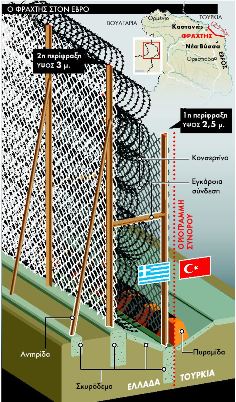By GRReporter
Picture: www.ethnos.gr
It was
just after midnight and it was raining cats and dogs when voices
shouting for help in English could be heard from the river. The border
guards, who patrolled the flooded bank of the Maritsa River in the
village of Mandra near Didymoteicho, floodlit the water and saw people
hanging from trees, shouting and waving at them. With a risk of being
dragged by the rising waters, they helped the people - a total of 9
people - get to the land. The tenth one, a seven-year-old boy, was sunk
into the water. As
the rescued people explained later to the police, Turkish traffickers
boarded them on a plastic boat and pushed them into the river to row
themselves and pass on Greek territory. The boat broke, however, and, in
order not to be dragged down by the risen river, they were forced to
climb on trees.
As
the rescued people explained later to the police, Turkish traffickers
boarded them on a plastic boat and pushed them into the river to row
themselves and pass on Greek territory. The boat broke, however, and, in
order not to be dragged down by the risen river, they were forced to
climb on trees.Episodes like this, which happened recently, were a daily routine not so long ago. Now, however, these happen less frequently. The operation for the prevention of the flow of illegal immigrants through the walls of the Greek-Turkish land border that were, until recently, "paper-like" for traffickers, is called "Shield". It has been in force since August and, apparently, is effective.
Only 45 arrests
According to data of the Greek police, if in July 2012, i.e. before the beginning of the plan, there were
 6,000
arrests in the Orestiada region, in January 2013, there were only 45
arrests. The presence of the disputed iron barrier, with a length of
12.5 km, on the land border between the two countries, in practice has
closed the most important, in recent years, route for illegal
immigrants. "Even a fly cannot pass through the barrier-protected area,"
said Regional Police Director George Salamangas, emphasising that "the
region has turned a new page in terms of solving the problem with
illegal immigration." Thermal cameras, located on pylons, monitor night
and day the border line, transmitting a real time picture to the police
Operation Centre.
6,000
arrests in the Orestiada region, in January 2013, there were only 45
arrests. The presence of the disputed iron barrier, with a length of
12.5 km, on the land border between the two countries, in practice has
closed the most important, in recent years, route for illegal
immigrants. "Even a fly cannot pass through the barrier-protected area,"
said Regional Police Director George Salamangas, emphasising that "the
region has turned a new page in terms of solving the problem with
illegal immigration." Thermal cameras, located on pylons, monitor night
and day the border line, transmitting a real time picture to the police
Operation Centre.A double relief
"We are relieved, the barrier is effective, the results are positive," emphasised Deputy District Governor Gogo Nicolaou. The Turks are also relieved. According to a report of the English-language newspaper Hurriyet Daily News, farmers, residents of the villages of Karaagach and Boshnakyoy, which are located near the border, are satisfied and believe that their villages will no longer be an entry point for large groups of immigrants. "For us, the barrier is good news that might discourage immigrants who trample the fields and cause damage amounting to thousands of Turkish Lira. Every night, some 20 to 30 people cross the border through our village and destroy crops. And not only this, our region has become infamous," say villagers.
The spring will be crucial
 The
construction of the barrier exempts significant police forces - both
people and equipment. Around 2,000 police officers were deployed along
the border until now and the equipment will currently strengthen the
coastline of the Maritsa River from Didymoteicho up to the delta. "The
battle is now transferred into the river and have to say that it's going
well," said an optimistic police officer. "The effective barrier and
the increased presence of our forces along the rest of the border are a
message not only to traffickers, but to the flows of immigrants as well
and this message is that Maritza can no longer be passed." Of course,
now, this optimism needs to be verified and this will happen in the
spring, when the river will recede and, as Salamangas admitted, the
delta of the Maritza River is a complex and difficult area.
The
construction of the barrier exempts significant police forces - both
people and equipment. Around 2,000 police officers were deployed along
the border until now and the equipment will currently strengthen the
coastline of the Maritsa River from Didymoteicho up to the delta. "The
battle is now transferred into the river and have to say that it's going
well," said an optimistic police officer. "The effective barrier and
the increased presence of our forces along the rest of the border are a
message not only to traffickers, but to the flows of immigrants as well
and this message is that Maritza can no longer be passed." Of course,
now, this optimism needs to be verified and this will happen in the
spring, when the river will recede and, as Salamangas admitted, the
delta of the Maritza River is a complex and difficult area.In any case, the iron barrier that was so controversial both in Greece and in the European Union in terms of its usefulness and effectiveness, seems that, for the moment, is a powerful weapon in the battle with illegal immigration in a region which is traditionally one of the most important entrances for immigrants from Africa and Asia to Europe. And whether immigration through the Aegean Sea will increase is another matter.
http://gogreece.about.com/gi/o.htm?zi=1/XJ&zTi=1&sdn=gogreece&cdn=travel&tm=6&f=22&tt=2&bt=1&bts=1&zu=http%3A//www.grreporter.info/en/

No comments:
Post a Comment